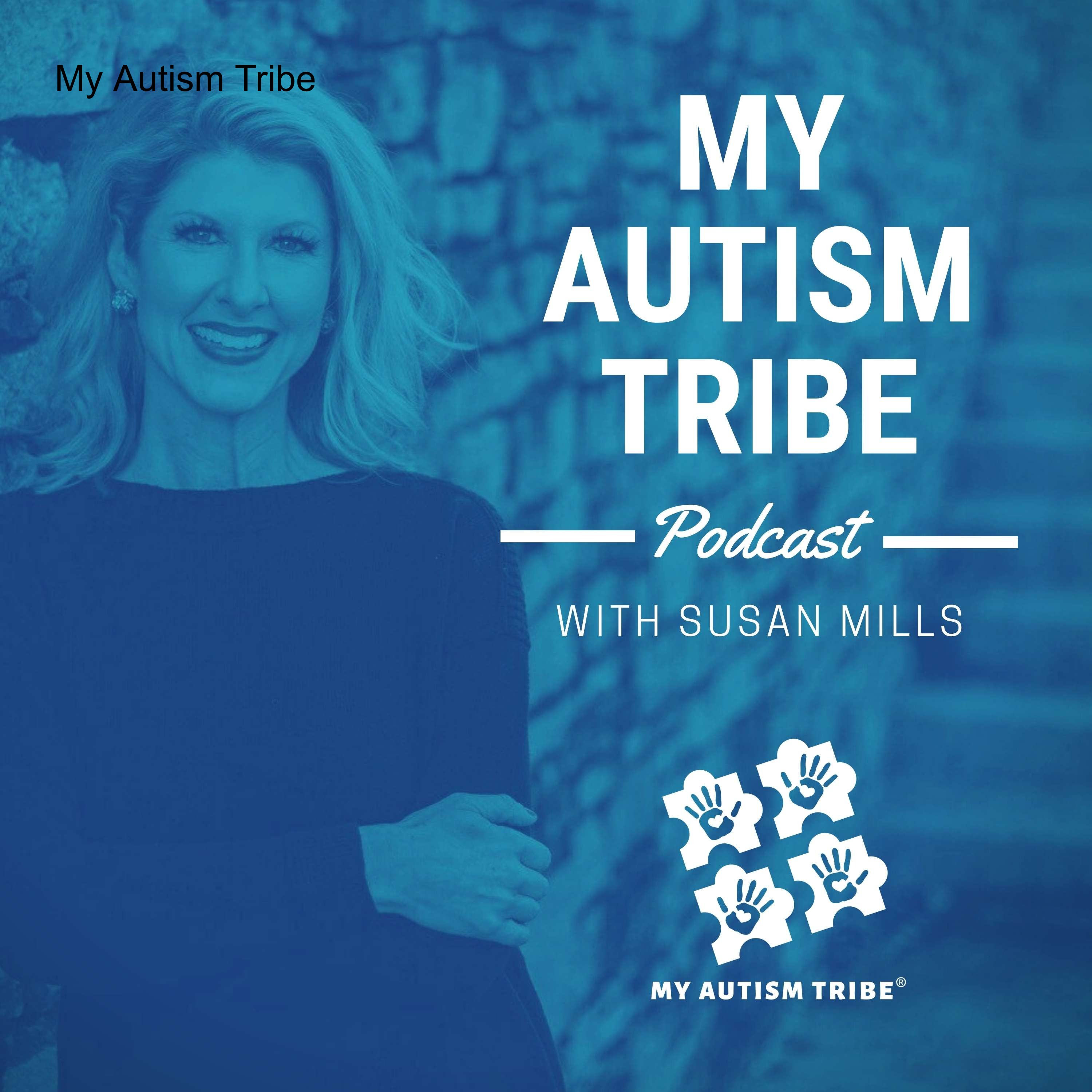Episodes
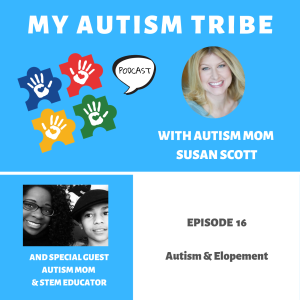
Monday May 06, 2019
Autism & Elopement
Monday May 06, 2019
Monday May 06, 2019
EPISODE 16:
Eloping is an all too common problem among children with autism, so much so that the phenomenon has been on the radar of the CDC for years. It’s described as the urge to leave protected and safe surroundings, such as a home or school, without notifying anyone. It’s also known as wandering, running or bolting.
The two primary reasons that a child may leave their surroundings is to leave a bad situation or to pursue something they want.
If you’ve discovered your child is a runner, you may already be aware of the measure you need to take. If you’re just beginning your autism journey, the idea of your child walking out the door in the middle of the night and vanishing may scare you to death, and you’re not alone.
We’re speaking with Tracey McEntyre today, and she knows firsthand the fear that surrounds elopement. She’s a mother, advocate, friend, STEM educator and business owner. Her most important role is being a mother to her 13-year old son Roman. When her son was diagnosed with autism, they began a new journey of advocacy for Roman, advocating for other families, and reinventing how our children learn.
CONCLUSION:
The CDC offers some helpful tips that can help you prepare in advance in the event that your child bolts:
- Set up an emergency response plan
- Keep a current photo of your child
- Have your child wear an ID bracelet
- Let anyone who may have regular contact with your child know they may wander
- Meet your neighbors and inform them of your situation
- Immediately call first responders
- Teach your child safety commands such as “stop”
- Teach your child to swim
- Teach them how to cross a street
- Meet with any healthcare providers who understand your child’s unique situation and ask for their expert advice
There isn’t any way to ensure 100% that your child is safe in this world. This just isn’t something that is possible for any parent, but with establishing proper safety measures, it will help to alleviate some of the fears that come with the possibility of facing this situation.
For more information you can visit the CDC and Autism Society websites, and of course, as always, please feel free to reach out to My Autism Tribe. Thanks so much for listening and I’ll see you next week.
IMPORTANT RESOURCES:
https://www.cdc.gov/ncbddd/disabilityandsafety/wandering.html
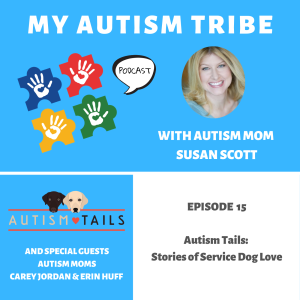
Monday Apr 29, 2019
Autism Tails: Stories of Service Dog Love
Monday Apr 29, 2019
Monday Apr 29, 2019
EPISODE 15:
For children with autism or other developmental disabilities, a service dog can make all the difference. They can be trained in a variety of tasks that address a range of issues facing a child with autism and the family. These include socialization, behavioral, and life skills, and fine and gross motor skills.
A service dog can rest his head on a child’s lap to calm or interrupt unwanted behavior, flip on a light switch if the child has a fear of the dark, press against the child to give the sensation of pressure, and even communicate with parents by barking when the dog senses the child needs assistance.
Today, we’re speaking with two autism moms that know firsthand how service dogs can help children who deal with development challenges or social anxieties.
More recently, Carey Jordan and Erin Huff created “Autism Tails” with the mission to provide information, some hope, and a better understanding of living with autism and these furry bundles of love.
CONCLUSION:
If you or your family are thinking about getting a service or therapy dog, perhaps begin by asking yourself these questions:
- Does your child like dogs?
- Might your child or anyone else in the household have allergies that might be aggravated by a dog?
- Is your family prepared and ready to take on the long-term commitment and expense of caring for a dog in sickness and in health?
- Are you comfortable handling a dog while caring for your child in public?
A service dog training agency such as Assistance Dogs International or Loyalty Service Dogs, and even our friends at Autism Tails, can help you sort through these questions while sharing some personal experiences.
For more information on Autism Tails, please visit: www.autismtails.net
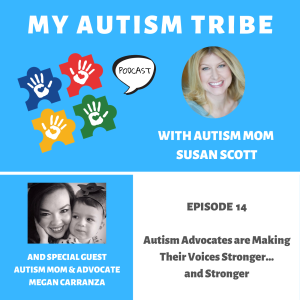
Monday Apr 22, 2019
Autism Advocates: Making Our Voices Stronger
Monday Apr 22, 2019
Monday Apr 22, 2019
EPISODE 14:
This month is Autism Awareness month, and if you ask any autism advocate what this means they will very quickly remind you that advocacy takes place every day, every month, not just the month of April. Family members, friends, professionals, educators, and autistic adults and youth want to make their voices stronger. We want to promote a culture of inclusion and respect, improve community resources, and we want make sure that all receive an equal opportunity in school and at work. This isn’t an easy task, and takes more than one individual and one organization. It takes us all.
On today’s episode, we’re speaking with Megan Carranza who is a mother, podcast host and autism advocate. After Megan’s oldest child, Logan, was diagnosed with autism in March of 2017, she became a mom on a mission to spread the message of awareness, acceptance and inclusion. Megan, just like many of us, saw a need for more support within the autism community and launched her podcast, “Adventures in Autism”. The purpose of the podcast is to create a safe and supportive space for families and individuals affected by autism to come together and share their journeys. Since this is a similar mission of My Autism Tribe, we thought it would be a perfect fit for a conversation!
…………….
CONCLUSION:
The My Autism Tribe podcast was started with a simple mission of making one voice stronger. It has very quickly grown to not only a podcast, but a nonprofit 501(c)(3) organization. To say that we’re excited about the growth, would be an understatement. Our voices are getting stronger, and with the continued push from all autism advocates, we ARE and WILL CONTINUE to make an impact. Thanks so much for joining My Autism Tribe…this month and ALWAYS.
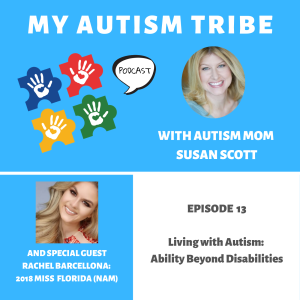
Monday Apr 15, 2019
Living with Autism: Ability Beyond Disabilities
Monday Apr 15, 2019
Monday Apr 15, 2019
EPISODE 13:
One of the most important missions of My Autism Tribe is to celebrate and empower the amazing individuals that are on the autism spectrum. There are so many! One of these amazingly gifted individuals is Rachel Barcellona. She is Miss Florida 2018 National American Miss (NAM) and was Miss Florida International 2016. Her platform “Ability Beyond Disabilities” inspires those that have challenges to strive for their dreams as well as to educate those who might not understand the challenges she, and others on the spectrum, face.
FROM RACHEL:
I am an advocate for those with disabilities. I created my platform, The Ability beyond Disabilities, to inspire those that have challenges to strive for their dreams as well as to educate those who might not understand the challenges we face.
As an individual with autism, I often felt like I could not do anything. People with disabilities or anyone who is different are often targets for bullies as I was, but because of my life and social experience, I have overcome many challenges.
Today I am the International Spokesperson for the Center for Autism and Related Disabilities at the University of Florida (CARD-USF), and was recently elected to their executive board of directors.
I was also named the Ambassador for the Unicorn Children’s Foundation and work closely with this international organization to help people with neurodiversity.
I am a member of the International Thespian Honor Society, an honor student and vocalist and love to sing opera. I have been able to single at Madison Square Gardens twice.
I have a passion for art and writing and am currently finishing my first book and will work to get it published when its finished.
I also work with several organizations that provide services to individuals with disabilities including therapy such as occupational and physical along with music and art therapy and have made over 300 appearances with my international title.
My plan for the future is to graduate from the University of South Florida and one day open my own school for children with disabilities.
I also wanted to share some of the things that happened while I was growing up. I just turned 22 years old but starting in preschool and elementary school things were much different. I was diagnosed with Autism along with dyspraxia and later diagnosed with dyscalculia, and epilepsy.
I can remember not being able to put enough pressure on a crayon to make a mark on a paper! Buttons zippers and snaps were a nightmare! It was very difficult to hold objects and jump and skip. I went through several years of physical therapy, speech and language therapy and occupational therapy, which helped a lot. I still however cannot ride a bike, although, I haven’t tried a 3 wheeler, and I am not able to drive. I passed my learners permit for driving but because of epilepsy and seizures I cannot get my license… yet! Hopefully one day but if not there are several ways to learn to get around. I joke with my parents that I am waiting for the Google car that drives itself!
Dyscalculia became an issue as math became harder. I am not going to lie it was exhausting getting through higher level math and took all the help I could get from teachers tutors etc. I am so happy to tell you I have finished my college math courses and will definitely not become an engineer. I am pursuing a career in writing English and vocal studies and love to sing opera.
CONCLUSION:
Education is so important, and what better way to be educated than through the voices of individuals like Rachel. It’s so powerful to hear their strength and their passion. Thanks to everyone in My Autism Tribe, today and always.
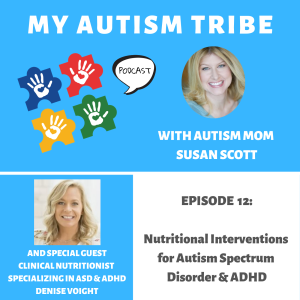
Thursday Apr 04, 2019
Nutritional Interventions for Autism Spectrum Disorder and ADHD
Thursday Apr 04, 2019
Thursday Apr 04, 2019
EPISODE 12:
Nutritional deficiencies are a common issue for individuals with autism and ADHD, in addition to food sensitivities and intolerances. Nutrition is important for everyone, and sometimes even the correction of a single deficiency can create dramatic improvements.
Today’s episode features guest Denise Voight, a clinical nutritionist with a Masters of Science in Human Nutrition and Functional Medicine, specializing in Nutritional Intervention for autism spectrum disorders and ADHD. Her passion for nutritional biochemistry for the past 20 years emerged from her own son’s struggle with ADHD. Now, she uses her expertise and compassion to help educate, empower, and support families affected by autism and ADHD.
CONCLUSION
Nutrition is the core modality of Functional Medicine. Instead of focusing on an isolated set of symptoms, it addresses the whole person – like genetic, environmental, and lifestyle factors. As researchers continue to explore and speculate on the reasons for the rise in autism, may we continue to educate ourselves so that we may be better-equipped advocates for our loved ones. Thanks for joining My Autism Tribe.
FOR MORE INFORMATION VISIT:
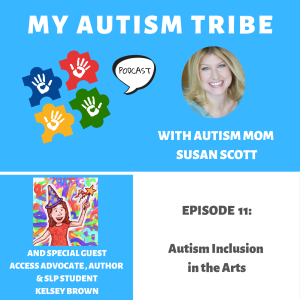
Thursday Mar 28, 2019
Autism Inclusion in the Arts
Thursday Mar 28, 2019
Thursday Mar 28, 2019
EPISODE 11:
As many people in the autism community know, inclusion is a large and important topic. Art is also a topic that comes up in many conversations. But what about inclusion in the arts? In today’s episode, we’re speaking with Kelsey Brown. She is a speech-language pathology student, access advocate, and children’s book author. She currently resides in Boston, MA where she is a Master’s candidate in Communication Disorders at Emerson College, and is interning with the Augmentative Communication Program at Boston Children’s Hospital. She has also spent the last year as the Access and Inclusion Apprentice at Imagination Stage.
BIO
Kelsey Brown is a speech-language pathology student, access advocate, and children's book author. Originally hailing from Lexington, KY, Kelsey currently resides in Boston, MA where she is a Master's candidate in Communication Disorders (Emerson College). When not studying, writing reports, or promoting her book, Kelsey enjoys seeing theatre, reading, and eating tacos.
A graduate of The University of Georgia with degrees in Theatre and Communication Sciences and Disorders, Kelsey currently interns with the Augmentative Communication Program at Boston Children's Hospital as well as the Access Champions Podcast and spent the last year as the Access and Inclusion Apprentice at Imagination Stage. When she grows up, Kelsey wants to split her time as a practicing Speech-Language Pathologist and Art Access Consultant.
In addition to her work in communication disorders and arts access, Kelsey has teamed up with her best friend and illustrator Joseph Wrightson to write a book! Come On, Calm! is a whimsical new children's book encouraging readers of all abilities to self soothe through sensory and breathing tasks.
CONCLUSION
Inclusion in the arts is so important for artists and performers with disabilities. Every artist, no matter what their background or disability, can share their diverse range of experiences and talents with others. Every artist can be celebrated, and we can all learn about and appreciate their gifts.
For more information on Kelsey’s book, please visit: http://kelseyrosebrown.com/comeoncalm.html
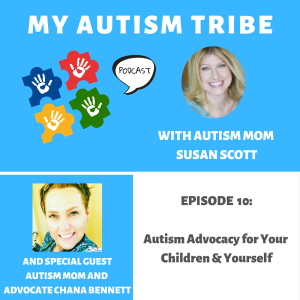
Thursday Mar 21, 2019
Autism Advocacy for Your Children and Yourself
Thursday Mar 21, 2019
Thursday Mar 21, 2019
EPISODE 10:
Raising children on the autism spectrum has its challenges, its rewards, good days and bad days. Perhaps, as a parent, you’ve often questioned yourself on what life would be like if your child was not on the spectrum, and if you would even want that. On today’s episode, we’re speaking with Chana Bennett. She’s the mother to twin boys that are on the autism spectrum, and last year she was also diagnosed with Autism Spectrum Disorder. Chana is now advocating for others, and advocating for herself.
CHANA’S BIO
There was a time when it was thought by experts that the high-functioning autistic female didn't exist. I am here to tell you that is not the case. I am 38 years old, and I found out that I have Autism Spectrum Disorder last year.
My life has been hard, but my struggles were seemingly imaginary to the world around me, until recently. This discovery, that I am Autistic, came after both of my 2-year-old fraternal twin sons were diagnosed with severe Autism late in the summer of 2016. It was a confusing time. I did tons of research on Autism after the twins were diagnosed, but I was only focused on my boys.
I wasn't aware that Autism presents differently in boys and girls until mid-2017. It was information that changed my life. I recognized myself in the research I was doing about females with Autism. The Mental Health Community had mislabeled me many things over the years, but Autism was never mentioned.
As a matter of fact, no one had ever mentioned Autism to me in any capacity until it was about my kids. When I talked to my mental healthcare team about my concerns that I was Autistic, they pretty much disregarded me.
It took a lot of searching to find someone to see me about an Autism Assessment for myself. It wasn't easy, but I am fairly persistent so in June of 2018 I was tested for Autism Spectrum Disorder. The results were conclusive that I do, indeed, have Autism.
It was upsetting in a way and relieving in another way. I was finally able to focus on getting the proper help.
I was soon to find out that there aren't many women like myself. Most of the professionals I have talked to in the Autism Community have rarely seen anyone like me. This is frustrating, so I have made it my mission to advocate for women like me to help inform people of the gender differences in High-Functioning Autism, mainly because I have had little luck finding information out there with which I can relate that has current relevance.
I hope that this introductory insight into my world can help other women like me, and their families create an accepting environment where talents can be discovered and utilized. I don’t claim to know everything, but I know what it is like to be me, and I am learning to accept it. Not only am I becoming more comfortable with myself, but I am thriving as a mother, partner, and overall human being.
This will benefit my family and the Autism Community as a whole because I am now advocating for changes in the treatment of Autistic People in the Metro-Denver Mental Health System.
CONCLUSION
No matter what your journey, and how hard and frustrating it may be, know that there are many people out there on a similar journey. Maybe they’re on a different path. Perhaps they are making different choices. But at the end of the day, isn’t it everyone’s goal to reach the same destination? Happiness. Acceptance. Inclusion. To love and to be loved. Thanks for being a part of My Autism Tribe.
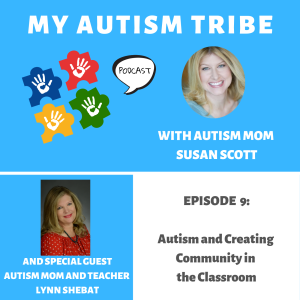
Wednesday Mar 13, 2019
Autism and Creating Community in the Classroom
Wednesday Mar 13, 2019
Wednesday Mar 13, 2019
EPISODE 9:
The Webster’s dictionary definition of “Community” is: a feeling of fellowship with others, as a result of sharing common attitudes, interests, and goals.
When building a community in the classroom, students are able to come together as a class to work towards the common goal of learning. It helps students feel valued and connected to the teacher and other students in their class.
In today’s episode, we will be speaking with Lynn Shebat, a teacher for over 30 years with a Master’s degree in Special Education. She is the author of soon to be published “Connections: A Journey in Love and Autism” with 1010 Publishers.
She is a mother of three daughters, and a new granddaughter. Her youngest was diagnosed with autism after she had been teaching for over 17 years, specializing in ABA and Autism with severe behaviors.
Currently, she is a Preschool Special Needs teacher, and was recognized as “Teacher of the Year, 2018”.
COMMUNITY IN THE CLASSROOM
What is community in the classroom and what does it look like with our population of children on the spectrum?
“In my class, I make a big effort to teach even the " littles", a sense of responsibility as well as inter-personal responsibility. This could look like sharing or turn taking or even clean up time. The secret is in the collective structure of the activity.
To a child, turn taking or sharing can be the strategy used to gain access to a preferred item, but as Teachers and caretakers we need to structure this learning moment to be a participation in a shared play opportunity with a peer or family member.
In the home it could look like helping out with household chores. I have my daughter assisting with all the basics of grocery shopping, running errands, and I started this when she was three. Now, she is eighteen so the function and her ability has increased.
With household chores, I purposely try to make even loading the washing machine a shared activity followed by a break or fun activity like making a snack. I do this to provide her with a feeling of helping me, participating in life duties, and giving her a part in the makings of our home.
If you think about it, all daily activities can be turned into shared activities with a functional purpose.” – Lynn Shebat
BENEFITS:
- Students increase their sense of safety, belong, and self-esteem
- There is inclusion for all students
- Children are exposed to lessons in positive values, respect, and responsibility
- Collaborative learning encourages positive and fulfilling relationships with others
- A child’s social, emotional, and academic competence is promoted
- Students tend to be more concerned about others
- They are more skilled at resolving conflict than others who were not a part of a classroom community
- Healthy conflict resolution skills results in students learning to cooperate in society in their future
- Meets their need to bond
- Creates an anti-bullying environment
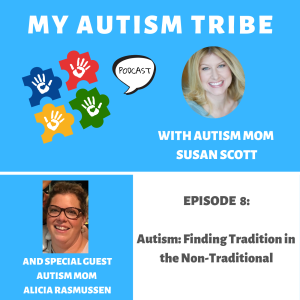
Thursday Mar 07, 2019
Autism: Finding Tradition in the Non-Traditional
Thursday Mar 07, 2019
Thursday Mar 07, 2019
EPISODE 8:
Perhaps you have found that the presence of autism in your life has expanded your mind in ways you never thought possible. Before I was a parent, I thought I knew how it worked. Fast forward just 5 years, and I’m now parenting in a way that I never thought I would. My son, my pride and joy, has taught me a few tricks along the way.
On today’s episode, I’m speaking with fellow autism mom Alicia Rasmussen on a few of the traditions she has established on her non-traditional journey. Her journey with autism began in 2006 when her four-year old son was first diagnosed. He is now a thriving teenager, an accomplished musician, who is currently studying Japanese, Korean, and French simultaneously, in addition to learning Danish. He’s travel the world as an exchange student and is planning on attending college to study music or further his language studies.
SUMMARY
Everyone deserves to have their gifts developed and nurtured in a way that leads to personal fulfillment and positive outcomes.
Some of the more traditional tips incorporate into your daily lives may include:
- First/Then
- Depending on your needs and the skill set of your child, you can do this verbally, or with pictures. “First we clean up, then we can play.”
- Timers
- Your child may need a 5-minute or even a 1-minute warning before there is a transition to a new activity. This helps a child feel more in control without controlling the parent.
- Reward Positive Behavior
- It’s really important to recognize behaviors that a child usually struggles with! Sharing, following directions, being quiet. With positive affirmation, you can let the children know their behaviors were noticed.
- Focus On “Positive Speak”
- Instead of telling your child what you DON’T want them to do, tell them what you DO want them to do.
- Lead By Example
- They’re looking at you to set the example for behavior. Even if you don’t feel calm, try to make sure that your behavior represents calm in sometimes-difficult situations.
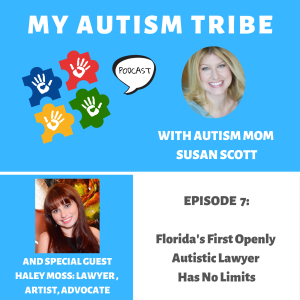
Thursday Feb 28, 2019
Florida's First Openly Autistic Lawyer Has No Limits
Thursday Feb 28, 2019
Thursday Feb 28, 2019
EPISODE 7:
Autism ranges from person to person. It can’t be physically detected and can confuse those who aren’t touched by it.
One amazing individual, was diagnosed with autism at the age of 3, and is now a practicing attorney in Miami, Florida. Her name is Haley Moss, and she graduated with her Juris Doctor from the University of Miami School of Law in 2018. She graduated from the University of Florida in 2015 with Bachelors degrees in both Psychology and Criminology. Haley is also a renowned visual pop artist, and the author of three books. She has recently gained national attention with People Magazine, CBS News, CNN, USA Today, and The Today Show. To say this young woman is making a positive impact, would just not be enough. Haley continues to prove time and time again that her diagnosis does not set limits on achievements.
HALEY MOSS: BIO
Haley Moss was diagnosed with autism at age 3 and is now a practicing attorney in Miami, Florida. She graduated with her Juris Doctor from the University of Miami School of Law in 2018, and graduated from the University of Florida in 2015 with Bachelors degrees in Psychology and Criminology.
She is a renowned visual pop artist and the author of “Middle School: The Stuff Nobody Tells You About” and “A Freshman Survival Guide for College Students with Autism Spectrum Disorders: The Stuff Nobody Tells You About.” She also was the illustrator and a contributor for the Autism Women’s Network anthology “What Every Autistic Girl Wishes Her Parents Knew.” Her writing has been featured in HuffPost, Elite Daily, The Mighty, and other websites and publications.
Haley was most recently honored with the 2019 Occhigrossi Family Youth in Service Award, the 2018 Publix Self-Advocate of the Year, the 2018 UM-NSU CARD Outstanding Self-Advocate, and the 2018 Voices of Hope Honoree by Birch Family Services in New York City. She was also recognized as a BlogHer 2016 Voices of the Year honoree and one of South Florida’s Young Leaders in Philanthropy. She was also presented with the Council For Exceptional Children’s Yes I Can! International Award in April 2011. Haley created the featured artwork as well as being presented with the Teen Hero Award at the 10th Annual Samsung Hope for Children event in June 2011.
She is currently serving on the constituency board for UM-NSU CARD and previously served on the board of Unicorn Village Academy.
SUMMARY
Always remember that a diagnosis is not a tragedy. It takes an open mind, lots of listening, and asking a ton of questions. Knowledge is power! One type of therapy that works for one child may not work for another. Be open to all types of therapies, and don’t be afraid to set high expectations. Most of all, unconditionally love your child. Find their amazing strengths and focus on those.
Thanks so much for joining My Autism Tribe!
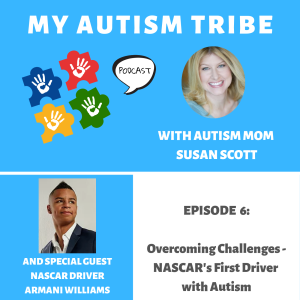
Thursday Feb 21, 2019
Overcoming Challenges: NASCAR's First Driver with Autism
Thursday Feb 21, 2019
Thursday Feb 21, 2019
EPISODE 6:
Despite the challenges associated with autism, there are so many individuals on the spectrum that are inspiring us all and proving that challenges can indeed be overcome.
One such individual is Armani Williams. He was diagnosed with autism spectrum disorder at the age of two-years-old and was considered nonverbal. He is now the first openly diagnosed autistic NASCAR driver. To date, Armani has 18 wins and two championships.
Autism is a disorder that is characteristically marked by difficulty focusing on and processing different stimuli and tasks simultaneously, in addition to complications with communication. These are two key skills for any race car driver. Initially, it seemed that Armani’s dream of becoming a professional NASCAR driver was impossible.
When he was eight-years-old, Armani began competing in go-kart racing, then bandolero styles vehicles, and quickly progressed to professional series. He raced in the ARCA Truck Pro Series in 2016, signing with SPEAR MotorSports. He broke records by becoming the highest finishing African American in a series race and the highest finishing African American in the series championship.
The same year, Armani was invited to compete in the NASCAR Drive for Diversity Combine and returned to the competition for a second year in a row. 2017 saw Armani move up to a higher level of competition to hone his skills as a race car driver and gain confidence in the former NASCAR Canadian Tires Series now the NASCAR Pinty’s Series of Canada. He was coached by the team general manager and driver Joey McColm, along with NASCAR Monster Energy Cup driver D.J. Kennington.
His personal diagnosis with autism and success on the track inspires his philanthropy off the track. In 2015, Armani and his family established the Armani Williams Race 4 Autism Foundation to raise awareness and promote research. He continues to speak to audiences and make appearances to local communities during race week to drive action and hope.
Some may have viewed Armani’s dream of becoming a professional NASCAR driver impossible. But Armani didn’t accept impossible, and his great support system has made Armani’s future, both on and off the track, both remarkable and bright.
Race 4 Autism: https://www.teamarmaniracing.com/

Thursday Feb 14, 2019
10 Simple Strategies for Inclusion
Thursday Feb 14, 2019
Thursday Feb 14, 2019
EPISODE 5:
Inclusion is a popular topic in the autism community, and for good reason. Often times, inclusion is mentioned in the educational setting, however it is much more than that. The definition of inclusion, when paired with diversity, is the deliberate act of welcoming diversity and creating an environment where all different kinds of people can thrive and succeed. Put simply, diversity is what you have. Inclusion is what you do.
Today we’re speaking with Kathryn Jenkins. She is a mom of three boys. Her oldest son was diagnosed with Autism at 2 years old, and is now 8. She became an advocate for him and is now an advocate for the autism community as a whole. She wrote and published her first book, Inclusion Alphabet in October 2018 and has subsequently been able to speak to schools and community groups on the inclusion topic.
“These simple strategies are based off how I initially started to connect and include my own son. I also want to point out that these strategies can be used for kids, adults, families, classrooms, and within the community. I teach and speak about these same 10 for everyone because I really think it applies to everyone.
Also in my research, I am seeing a lot of kids struggling with bullying but even more so with loneliness. I think that’s a huge topic that needs to be addressed, especially in the autism community and I feel like these 10 are a good way to start engaging and creating respect amongst everyone. “ – Kathryn Jenkins
10 Simple Strategies to Start Including Someone Who is Different.
- Get into his or her world— you might need to be prepared to give before you take, my son loved numbers and running so we counted and ran. In another example, they might not want to join you and play basketball at recess but they might be willing to play something they like first. Be willing try what they want first
- Listen through words and behavior —you can learn a lot about why someone is doing something or not doing something by observing, not saying a word, and seeing how things play out. Sometimes you receive feedback and can listen to that person, other times through consistent behaviors — you find a solution to make the relationship work or to correct or understand that behavior.
- Try at certain and predictable times — people like to know what to expect especially if there is anxiety or trauma associated with their differences. Simply knowing that they will be trying to be a friend during this time of day or that they can help that process and get things started makes it easier. (Ex: engaging at lunch each day, or for a few minutes before the start of class, talking in the evening before bed or at the dinner table)
- Set up for success — this was said to me over and over by therapist, and now I know (ex: start with smaller goals or requests and move from there, adapt your surroundings)
- Be consistent, keep your promises — trust plays a huge role in relationships. Even when people don’t act like it, they want to count on you. No one ever wants to feel betrayed or lied to and even though it’s a small thing, it’s probably not to that person.
- Engage in a unique way — Engagement and play time might be different. It might be side by side play, it might be watching someone play a video game and not talking, it may include adapting your equipment so that you can still play a game of basketball, perhaps you are going to use a different ball or you are going to change the rules. You might choose to play a board game without rules and engage that way. Be creative, and flexible.
- Accept the differences, find the similarities — even though Johnny paces or has stimming behaviors that make him more comfortable and that is different; Johnny still likes Minecraft and Legos and Pokemon. There are similarities to find.
- Forgive, say sorry, and forgive again — so easy to preach and so hard to do but without forgiveness, Inclusion cannot exist.
- YOU are part of the inclusion team too — we focus so much on including others that have been excluded that sometimes it’s the caretaker or the friend that ends up feeling alone. Make sure it’s working for everyone is key because if it’s not, it’s not working for anyone.
- Educate yourself — read books, watch movies, gain more insight through experience. Knowledge is power and I find as we gain more knowledge and experience, we gain more understanding and empathy too.
“Inclusion to me is the process of accepting, supporting, creating, and finding opportunities for each person to reach their full potential regardless of race, religious beliefs, ethnicity, sexual identity, physical or psychological ailments, intelligence, differences, or other attributes that may set them apart from you. It is not about placement or being in the same room together. Inclusion allows us to be our best selves and it shouldn’t stop or hinder anyone else’s ability to succeed. Everyone’s potential has value and is worth promoting. “ – Kathryn Jenkins
Instagram: @Inclusion_Project
Inclusion Alphabet: https://www.amazon.com/Inclusion-Alphabet-Everyone-Kathryn-Jenkins/dp/1732740429/ref=sr_1_1?ie=UTF8&qid=1550103357&sr=8-1&keywords=Inclusion+alphabet
Website: https://www.inclusion-project.com/
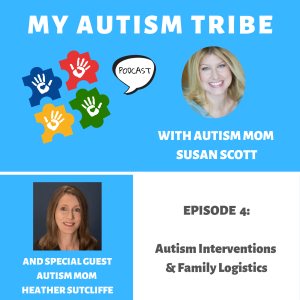
Friday Feb 08, 2019
Autism Interventions and Family Logistics
Friday Feb 08, 2019
Friday Feb 08, 2019
EPISODE 4:
Heather Sutcliffe is a working mom of two sons, who both have an autism diagnosis. For more than 12 years, she has advocated fearlessly to ensure her sons receive robust and consistent programming to make progress and achieve. A strong believer in coming at this diagnosis from all angles, she never takes her foot off the gas and continually looks at ways to fine tune her sons’ interventions. To honor the progress ABA therapy has made possible for her family, she recently launched a non-profit organization to support ABA for autism. Her first campaign running through 4/2/19 is to raise $5,000 that will go toward covering tuition for Simmons University students studying ABA. In addition, to reduce the ramp up time for parents and families dealing with a recent diagnosis, Heather is in the process of creating a website and blog to share what she has learned on this journey so far. Heather is passionate about giving her sons the best possible chance to overcome the challenges they face while inspiring and empowering other families to do the same.
Heather is a mentor, coach and cheerleader for other parents facing an autism diagnosis. Her extensive professional work experience in the fields of marketing and communications, is supplemented by her volunteer experience. She currently volunteers as a Support Parent with Family Ties of Massachusetts and was recently selected by Autism Speaks to be a Autism Speaks Volunteer Advocacy Ambassador. She is also a Board Member of a pediatric wellness center in Massachusetts.
PODCAST SUMMARY
The Importance and Power of ABA:
- Completely individualized for the child and situation, transcending all levels of ability
- Data driven to prove progress, then continue building on it
- Scaffolding necessary for success and progression
- Principles of ABA can be applied to our every day life to keep things going at home and in the community (can share some tips here)
- About both quality and quantity (can share some tips here)
“ABA (Applied Behavior Analysis) therapy has been absolutely vital to help our sons make progress after an autism diagnosis. 12 years in, it is still teaching me how to manage situations AND helping our sons make achievements. As it pertains to autism, simply put: ABA therapy helps our sons exhibit more expected behavior and less unexpected behavior. It truly has the power to make any situation more successful, transcending any level of ability. For me, this diagnosis has always been about one thing: Achievement. As the world moves from awareness to acceptance, we parents have always been focused on achievement. Because everyone has the chance to progress from the point they are currently to something more. ABA Therapy, a science rooted in data, makes achievement possible.”
You Get Out What You Put In:
- It is ok to be a control freak here--it is your child!
- Know and believe that you are the expert in your child, no one else.
- Play a consistently engaged and active role; observe sessions and ask questions
- If your gut tells you something listen to it...
- Don't settle
- Be hungry for information; seek it out and add it to your expertise
- Come at this from all angles and keep fine tuning.
“You are the HUB and the GLUE of communication (doctors, specialists, schools, insurance, therapists, home assistance) and you connect the dots for everyone and keep reminding of the objective (for your child to live safely and independently in this world). This takes work and constant engagement. Thank goodness for iphones. :-) But I believe in what I call a "complete puzzle": Parents will ensure all the pieces to the plan are in place and that we are attacking this. The plan needs to be fluid, but it is possible to go to bed at night and know you are doing everything you can.”
The importance of a network:
- Other parents: To bounce things off of, get referrals from, complete understanding.
- Providers and specialists: So if there are changes (or valleys and there will be) there is never a gap and always someone to call.
And, finding what keeps you going:
- A picture with your child looking at the camera so you can stare into their eyes for as long as you wish.
- Or when you visit someone you haven't seen for awhile, and they are so impressed by the cumulative progress your child has made, that may get lost since you see them every day.
- I also recently put a photo book together for my younger son, and it was such a good way to see all that he had tried...looking at it cumulatively.
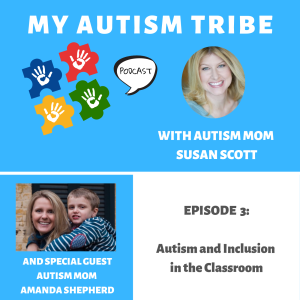
Friday Feb 01, 2019
Autism and Inclusion in the Classroom
Friday Feb 01, 2019
Friday Feb 01, 2019
EPISODE 3:
Many autism families struggle with making the choice on inclusion in the school classroom. Is inclusion the right choice for your autistic child? Some children will really thrive in an inclusive setting, but inclusion may not always be the best choice. Inclusion may also work well for a period of time, but then become more difficult as the child grows older. Perhaps a child needing a specialized autism support classroom when they’re young, may mature to the point where inclusion is a great option.
In today’s episode, we’re speaking with educator Amanda Shepherd. She just so happens to also be an autism mom. Amanda has professional (and personal) experience surrounding the inclusion, school choice, therapy, and IEP topics. She’s really excited to come along side to support and help others in their journeys as well.
QUESTIONS ABOUT YOUR CHILD AND YOUR SCHOOL DISTRICT THAT SHOULD HELP YOU FIND THE ANSWERS THAT YOU NEED:
School Related Questions
Every school district has a different level of commitment to and support for inclusion. In addition, different districts have different ideas about what inclusion looks like and for whom it is most appropriate. With that in mind, it's helpful to do the research required to answer these questions about your particular district and school.
- What kinds of support does your school district offer to ensure success in an inclusive setting? Your district will not provide you with a "menu" of autism support options because, in theory, every child's program is developed for that child's unique needs. The reality, however, is that most schools have a limited list of options which might (or might not) include teacher training, inclusion support staff, resource rooms, aides, therapists, and so forth; if your child's needs don't fit their offerings it can be tough to make inclusion work. To find out what's really available, visit the schools and ask probing questions of administrators, teachers, and other parents.
- How flexible is the district relative to different learning styles and behavioral issues? In some districts, teachers have a fair amount of creative license and may use technologies or other tools to help kids with different learning styles to understand what's being taught. In other districts, teaching is mainly lecture-style—an approach that's very tough for many kids with autism who have difficulty with following rapid spoken language. Some districts have flexibility regarding behavior: kids who need to get up, pace, rock, or flick their fingers are allowed to do so within reason. Other districts are very strict about unusual behaviors, which can make learning almost impossible for some autistic students.
- How well does the district work with parents? Other parents and your own observations will quickly tell you whether the district works with or against special needs parents. Obviously, it will be harder to work with a district that sees parents as the enemy!
Student Related Questions
Even if your district has a wide range of supports and resources for their students with special needs, your individual child might not be right for inclusion. Inclusive settings, particularly after grade two, tend to have 20+ children in a classroom with a single teacher. They often move from concept to concept quickly and may require children to respond instantly to teachers' questions or requests. Some children with autism (with or without support) can manage such settings; others find them extremely stressful. By answering these questions about your child, you'll have a better sense of whether inclusion is right for him or her.
- How does your child learn? Even the best general education classrooms rely largely on verbal instruction (particularly after grade two, when students must prep for standardized tests). If your child really can't process spoken or written language quickly, the general education classroom may be a poor match for his academic needs. Even with an aide, your child may wind up in the same space as typical learners, but otherwise completely segregated.
- Just how difficult are your child's behaviors? While you may be within your legal rights to insist that a child with really severe behavioral challenges be placed in an inclusive setting, such a setting may not make sense for your child or his classmates. Inclusion is intended to foster positive peer relationships and increase a child's chances of doing well in a typical setting; a child who screams, hits, or otherwise upsets his classmates and teacher is unlikely to gain those benefits. Your child may do better, at least for the time being, in a setting where behavior modification is a major part of the academic program.
- How does your child feel about the inclusive setting? Every child with autism is different. Some children thrive in an inclusive classroom but others feel ostracized or may even be bullied. Yes, those issues can be addressed in many cases, but for some youngsters, at least for some period of their lives, a more specialized classroom may be a better social fit.
CONCLUSION
The more you know about your district, your child, and your own tolerance for challenging school situations, the easier it will be for you to make a smart decision about your child's academic setting. Bear in mind that everything you decide today may change, as a new superintendent, new teachers, new classmates, or your child's new skills make inclusion more or less desirable.
References: https://www.verywellhealth.com
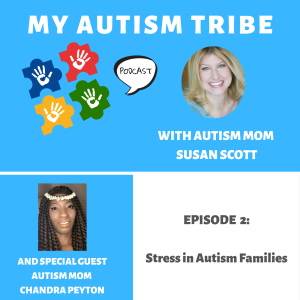
Saturday Jan 26, 2019
Stress in Autism Families
Saturday Jan 26, 2019
Saturday Jan 26, 2019
EPISODE 2:
Families of children with the autism spectrum (ASD) diagnosis often report high levels of stress. When a child receives an autism diagnosis, it affects every member of the family in different ways. With the primary focus now being shifted on helping the child with ASD, this may put stress on marriages, siblings, work, finances, and responsibilities. So much time, and very often dollars, are shifted towards finding treatments for the child, and other priorities are minimized or even excluded.
Someone that knows first hand about stress surrounding a diagnosis is Autism Mom Chandra Peyton. She’s the incredible mother to not one, not two, but three sons that are all on the autism spectrum.
Conclusion:
In your family, you can develop ways to manage those stressful times.
- Involve members of your tribe and create a network of help and understanding
- Get organized. Focus on getting one thing done at a time and establish family routines.
- Look after yourself. This is so easy to forget, but it’s important that all family members, including yourself, have time to do things that make them happy.
Most of all, know that’s it normal to feel a range of emotions. Shock, sadness, anger, denial, loneliness, and acceptance. This is the grieving process. Whatever your feelings, it’s important that you recognize them and acknowledge that they are A-OK.
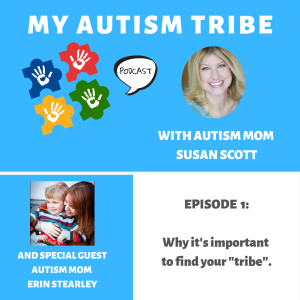
Saturday Jan 19, 2019
Why It's Important to Find Your "Tribe"
Saturday Jan 19, 2019
Saturday Jan 19, 2019
EPISODE 1:
In today's episode, Erin Stearley will be my advocate guest. A fellow Autism Mom, she's not only a friend, but a member of my tribe.
About Erin:
"I'm a wife and mom, former ER nurse to CEO of our household. I have 3 beautiful children. You might be wondering why I'm here....welp me too? But really it's because 4 years ago we received life changing news "your sweet, precious, angel, baby boy has autism spectrum disorder". Okay they didn't quite say it in those words, but that's what I heard. I don't really have any specific qualifications other than being a mom with a fierce love for her child/children."

